jim crow
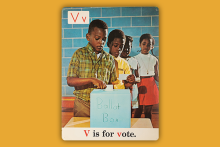
I PROUDLY SHARE the legacy of generations of people who fought to be respected as full citizens in America. I am the granddaughter of Mississippi sharecroppers. My parents picked cotton growing up, sometimes missing school to ensure the family could make ends meet. My parents left Mississippi in the late 1960s after college, having never voted. I know too well about voter suppression and the horrors of Jim Crow. The fundamental right to vote is close to my heart; it’s personal.
My generation was the first in my family born with full voting rights. I never thought the precious right to vote would be jeopardized in 2024. Yet, because the Supreme Court gutted the Voting Rights Act in 2013, the right of full and safe access to the ballot box is again impeded. Voter suppression has again taken hold as a tactic for dismantling democracy. The ghost of Jim Crow keeps on haunting.

In this week’s conversation with writer and novelist Alessandra Harris, we spoke about her love of writing and when she first realized she wanted to be a writer. She was in fourth grade and the story she had written about a genie was chosen by her teacher to receive a prize. When you’re a kid, there’s just something extremely compelling about the fantasy of encountering a genie who will grant you wishes galore. Of course, as a kid, our wishes are rather innocent and self-centered: “I wish I could meet Michael Jordan,” “I wish the Chicago Bulls could win one more championship,” and, last but not least, “I wish for more wishes.” As you grow up, you realize genies aren’t real but that doesn’t prevent you from imagining what you’d wish for if you had three, two, or even a single wish. And as we age, our wishes tend to transform into a single hope for something innocent and unselfish.
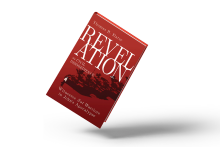
JOHN LEWIS died the week I read this book. No American alive in 2020 was a better witness to the courage of nonviolent civil disobedience than Lewis. Ironically, that same week “warriors” from the federal government descended, uninvited and unidentified, on Portland, Ore. Violence exploded. The Bible’s final book, Revelation, seems more relevant than ever.
Thomas B. Slater’s slim volume is not a typical commentary on the biblical book, analyzing all its chapters and decoding all its symbols. Instead, Slater focuses on the political situation of seven small house churches in Roman-dominated Asia Minor (now western Turkey), to whom John of Ephesus wrote (Revelation 2-3). These believers lived in cities where temples or shrines represented the imperial cult, and all subjects were expected to offer sacrifices to the current “divine” emperor.
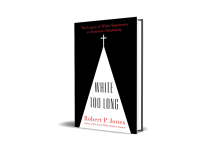
Every nonfiction book is personal, often arising from some faint but persistent insight, a kernel of awareness that blossoms into a story that demands to be told. White Too Long began with a growing consciousness of the abiding presence of white supremacy within the faith we white Christians have inherited and live within.
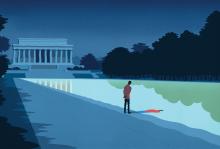
Reynolds arrived at an early morning protest in St. Paul, Minn., a few hours after Philando’s death. I heard her tell her story to a small crowd gathered on the street. Weeping, she shared how impossibly stuck they felt in the 74 seconds between stopping their car for the police and Castile being shot multiple times.
Castile was never given a chance to show identification because he was shot as he reached for his wallet. He tried to tell the officer about his legally licensed handgun, but the screaming officer didn’t seem to hear.
As Castile, Reynolds, and her young child ran errands on that summer night, civil rights laws did not protect their “life, liberty, and pursuit of happiness.” The Civil Rights Act of 1964 allowed for Castile’s employment at an elementary school and made legal their right to move through town. But these rights were not enough to protect Castile’s freedom to live.
What is democracy?
As U.S. Christians and others fight to defend the space for justice created by civil rights movements of the past, another theme rises: What does freedom mean in America today? What does Reynold’s rage require of people of faith?
At a minimum, it requires moving beyond a Sunday school version of democracy, as Southern Freedom Movement leader and historian Vincent Harding put it in 2002. “A solution of the present crisis will not take place unless ... [we] work for it. Human progress is neither automatic nor inevitable ... Every step toward the goal of justice requires sacrifice, suffering, and struggle. ... This is no time for apathy or complacency. This is a time for vigorous and positive action,” Harding said, quoting Martin Luther King’s Stride Toward Freedom.
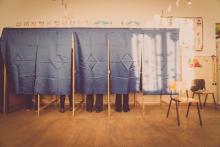
The purpose of Lawyers and Collars is to equip and empower pastors and local church leaders to work alongside lawyers to protect vulnerable citizens at voting precincts. Together, we can provide a legal and moral presence against voter suppression, intimidation, and harassment that are expected to rise in the 2018 midterm elections. The campaign welcomes the involvement of imams, rabbis, and other faith leaders.

People of all religions and political leanings are speaking up against the administration’s policy of taking children from parents — but that’s not enough. We also must challenge the ideology that produces these human indignities, the mindset that supports them, and the perverted theology that blesses them. Those things have been around from our country’s beginning.

I have been writing, speaking, and teaching about the manifestations and impact of white privilege since I finished my doctoral work on the subject in 2004, and one of the more difficult subjects to address with white audiences is the question of reparations. While white people tend to frame the subject as a discussion about how much money is going to be taken away from them, there is another way to think about it. Getting white people to give up wealth is a bit of a non-starter, no matter how persuasive the argument might be for its justification.
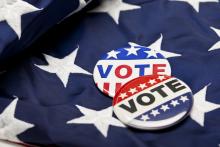
North Carolina’s requirement that voters present photo identification at the polls has long been called a disguised attempt to suppress the black vote. The Rev. William Barber and Jonathan Wilson-Hartgrove have called voting rights rollbacks, like the one in North Carolina, the “second career of James Crow, Esq.” for their racially discriminatory impact.
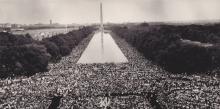
The Bahá'í writings say that human beings are like mines rich in gems of inestimable value and that one of the purposes of this earthly life is to discover our God-given gems, polish them, and bring them out to serve humanity. Today I write about a wonderful woman who has offered her many incredible gems in service.

Donald Trump is clearly appealing to our worst instincts, as many have said, but let’s be more clear: Donald Trump is appealing to the worst instincts of white people, and American history has shown how ugly and violent those white instincts can be. He is right when he claims to be bringing out people that have never voted before — but he leaves out that those new voters are angry white people.
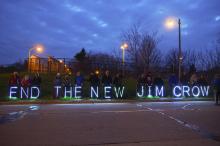
Our lawyers have made a strong case this week that the voter ID component of this legislation places an unnecessary and undue burden on voters — especially poor and African-American voters. We will ultimately win this fight in the courts. But this case is about much more than defeating voter ID laws. It is about a central question of 21st-century American politics: is a multiethnic democracy possible?
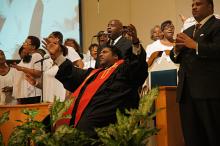
NC NAACP vs. McCrory is a necessary interruption to the institutionalized racism that is killing black and brown people. For all the talk around “black lives matter,” Rev. Barber warns, we are in danger of only affirming that black death matters if we accept that the martyrs of Charleston deserve nothing more than the removal of a Confederate flag from their state house. Yes, the flags should come down. But if they go away while the unjust laws remain, then it may be even harder for us to see that the root of injustice is in an imbalance of power.
And the fundamental power of citizenship in this country is still the franchise.
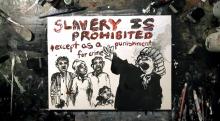
A new video developed by artist Molly Crabapple and the Equal Justice Initiative shows exactly how slavery paved the way for our current system of mass incarceration.
In particular, the video highlights the horror of the domestic slave trade, tracing the development of an elaborate mythology of racial difference — a mythology that once perpetuated slavery and now sustains mass incarceration.
“In many former slave states, slavery did not end. It simply evolved,” says narrator Bryan Stevenson, who directs the Equal Justice Initiative.
Molly Crabapple, known for her artistic contributions to Occupy Wall Street, creates videos combining the fast-paced style of dry-erase animation with the intricate watercolors of an award-winning artist.
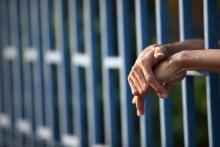
One in thirty-one. That’s how many Americans are in in jail, in prison, on probation, or on parole. In the U.S., our incarceration rate is 10 times higher than that of other countries while our actual crime rate is lower than those same countries. Citing a 600% increase in the prison population since the 1960’s, with no correlating increase in crime, Michelle Alexander has called mass incarceration “the new Jim Crow.” When people of color represent 30% of the U.S. population, but 60% of those incarcerated, we are in league with David, staring at a towering giant, armed with a prayer and a handful of stones.
While the work before us is daunting, people of faith are called to fight giants. The Spirit who we remember in Pentecost, the Spirit who set the world on fire, has trusted us with this work. We are giant slayers, by God’s grace. For this reason, it is fitting that we revisit the story of the first giant slayer, a young boy who tended sheep and fought off bears and lions.
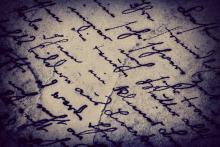
MY GREAT-GRANDMOTHER, Elizabeth “Lizzie” Johnson, was born in 1890 in Camden, S.C., with a different last name from all the other people in her household. Three generations later, we have no idea where the name Johnson came from.
Lizzie grew up working plantation land owned by her grandmother, Lea Ballard. Lea received the land in the wake of the Civil War: We don’t know how or why, though one theory speculates that Lea, who was listed as a 42-year-old mulatto widow on the 1880 U.S. Census, may have been the daughter of her slave owner. He may have given the land to her after the Civil War. We don’t know. We only know that Lea owned it, that she had 17 children who worked that land, according to family lore, and that the city of Camden eventually stole the land from her by the power of eminent domain. This we know from records I hold in my possession.
Lizzie married a railroad man named Charles Jenkins. Lizzie and Charles had three children; Charles later died in a railroad accident. Lizzie had a choice: endure the brutality of the Jim Crow South alone with three kids, or move with the stream of black bodies migrating north. Lizzie migrated to Washington, D.C., and, eventually, to Philadelphia and took her lightest-skinned child with her.

State Sen. Sylvia Allen, R-Ariz., wins the top prize for this year’s silliest religious idea so far.
While debating a proposed law that would permit people to carry concealed weapons in public buildings, Allen said, “Probably we should be debating a bill requiring every American to attend a church of their choice on Sunday to see if we can get back to having a moral rebirth.”
Although the senator said it was a “flippant” suggestion, she remained unapologetic for her comments on “the moral erosion of the soul of America.”
THE GOSPELS OF Mark and Matthew both include the story of a Gentile woman who begs a reluctant Jesus to heal her daughter (Mark 7:24-30 and Matthew 15:21-28).
I thought of these texts last fall while reading I Know Why the Caged Bird Sings, an autobiographical work of the acclaimed poet Maya Angelou, who died last year. Born in 1928, Angelou spent most of her childhood with her grandmother in small-town Stamps, Ark. After a few years of eating candy from her grandmother’s grocery store, Maya developed two cavities that, she writes, “were rotten to the gums.” However, the white dentist in Stamps did not take “Negro” patients, and the closest black dentist was 25 miles away.
For several days no aspirin touched the blinding pain, so her grandmother finally took her to the white dentist, determined to beg and plead for help. Her grandmother recounts the dentist’s final rejection in highly colorful language: “Said he’d rather put his hand in a dog’s mouth. … He said, ‘Annie, I done tole you, I ain’t gonna mess around in no niggah’s mouth.’”
We may recoil at such naked racism, but in the segregated Jim Crow South, this sentiment must have been typical. I can imagine white churchgoers reacting to this story by thinking, “The nerve of that woman begging help from a white dentist! She got what she deserved.”
I WAS ONCE told that “racism is our nation’s original sin.” This statement jolted me. While I didn’t dispute its truth, I have come to realize racism is much more complex than this.
In order to dismantle the structural sin of racism, we have to first set it within a larger context that acknowledges racism’s sociopolitical dependency and structural interconnectedness.
First: “race” is not real. It is not a scientific category; biologically, it does not exist. Race is a social construct, something built systematically. It has no inherent value or true significance beyond what we give it. In order for race to have real social consequences—which it undoubtedly does—there must be other phenomena at work that validate, sustain, and reinforce the social significance of race.
As a result of sin in our fallen world, human bodies are appraised and given a value based upon certain criteria. As a result of sin, men are privileged over women, white skin is privileged over darker skin, able bodies are privileged over disabled bodies. Historically, certain bodies are acclaimed while others are defamed. Race plays a starring role in this larger drama of embodiment.

I’m very offended. Or so I’m told. As a believing Christian, I’m supposed to be deeply troubled by the remarks that President Barack Obama delivered at the recent National Prayer Breakfast here in Washington, DC. Former Virginia governor Jim Gilmore had this to say:
The president’s comments this morning at the prayer breakfast are the most offensive I’ve ever heard a president make in my lifetime. He has offended every believing Christian in the United States. This goes further to the point that Mr. Obama does not believe in America or the values we all share.
Strong words. But what were Obama’s terribly offensive remarks? Here’s what the president said:
And lest we get on our high horse and think [religious violence] is unique to some other place, remember that during the Crusades and the Inquisition, people committed terrible deeds in the name of Christ. In our home country, slavery and Jim Crow all too often was justified in the name of Christ.
Wait… what? Why should I be offended by that? That’s a fact. That’s our history. Every Christian should be aware of what we are capable of when we turn our eyes away from the self-sacrificing love of Jesus and instead turn Christianity into an ideology that justifies terror, brutality, oppression, and war.
It should be impossible to study Western history without getting some glimpse into the terrifying possibilities that any religious system — including Christian ones — hold out for those who seek to dominate others. We humans have a long track record of twisting our most precious faith into a weapon of violence and hatred. This shouldn’t be a controversial statement; it should be a matter of ongoing repentance and prayer for people of faith everywhere.
So I’m confused.